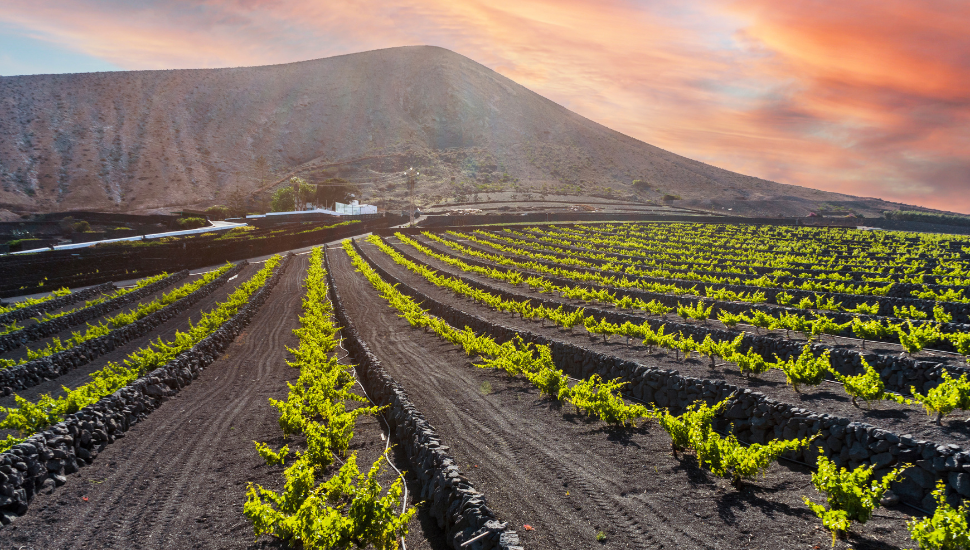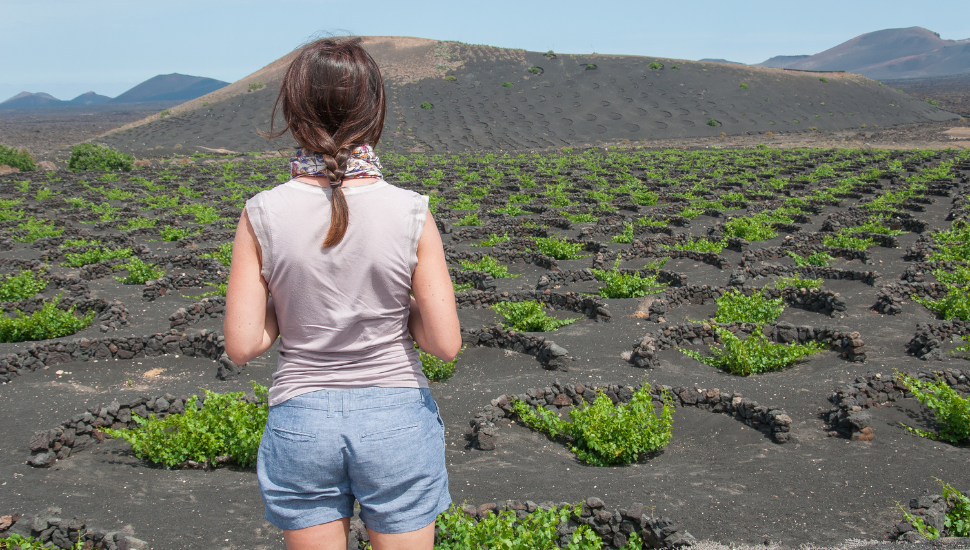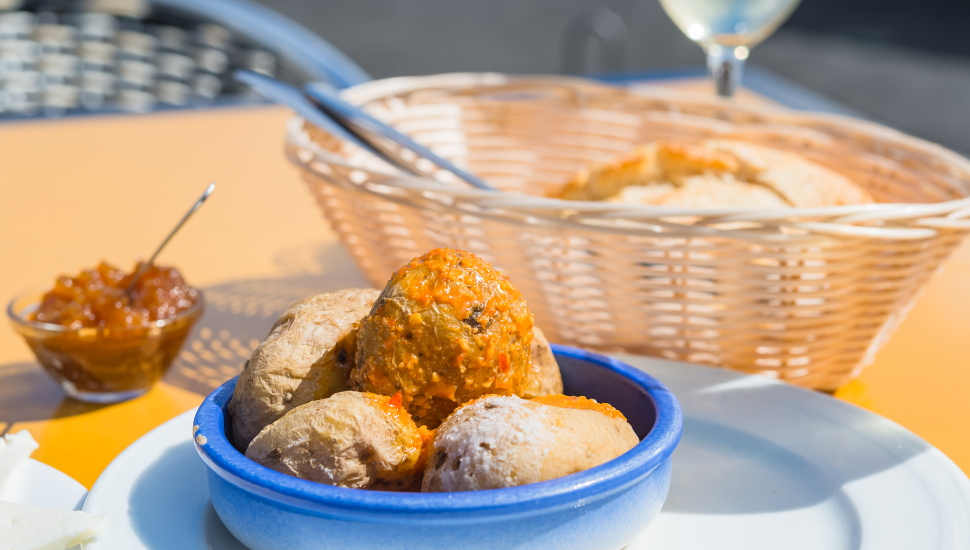Lanzarote Vineyards: Plan the Perfect Lanzarote Wine Tour
Compact Lanzarote is the polar opposite of European wine regions, featuring vines planted in semi-circular patterns whose greens contrast starkly with the dark picon gravel that comprises the surrounding landscape.
The island has been famed for its wine making for centuries (the old Malmsey wine dates back to the time of Shakespeare), but a turning point came in the 1730s, when devastating eruptions showered the land.
Before this, the La Geria region had fertile farmland.
As the island recovered, farmers discovered they could plant vines under the volcanic top layer - with fantastic results.
Even today, nutrient-rich volcanic soil is spread over the soil beneath, sealing in moisture.
About the wines of Lanzarote
Many Lanzarote wines are made of malvasia volcanica, a grape variety that, as the name suggests, thrives in volcanic soil.
The range of tantalising dry, semi dulce and semi-sweet malvasia are fabulous over a relaxed afternoon lunch.
Fragrant moscatel is another variety that soaks up Lanzarote’s dense nutrients extremely well - and is equally favoured by the island's artisan winemakers.
All grapes are hand-harvested, with local mucking in to get the precious crop off the vines.
Most wineries produce in small quantities, making their wares even more special.

Challenges facing Lanzarote’s winemakers
Winemaking on a Lanzarote vineyard is not easy: with no lakes or rivers and low annual rainfall, winemakers have their work cut out. However, northerly winds bring life-giving early morning dew, with filters down to the vine roots. They are planted in hollows known as hoyos of up to two metres in depth.
The precious fruit are given an extra helping hand from low, semi-circular walls built from volcanic rock - which create a microclimate perfect for grapes.
All this adds up to a low grape yield: around 400 vines per hectare compared to several thousand on an average European vineyard.
Instead of quantity, Lanzarote’s winemakers focus on quality.
Here, the small details make all the difference. For instance, grapes are collected in small containers to prevent the fruit being crushed - which would trigger the fermentation process prematurely.
Most Brits seldom get the chance to try a Lanzarote wine because yields are so low that the precious bottles seldom survive beyond the bars and restaurants of Madrid (or those of Lanzarote itself!).
Cue the perfect excuse for a wine-themed break on this unique island; it might be the only chance you get to sample these tantalising tipples!
What do the wines of Lanzarote taste like?
For the uninitiated, the island’s malvasia whites are reminiscent of jasmine, apricots and peaches, and are perfect for enjoying in summer.
The wines of Lanzarote are crisp and fruity, with a lingering and intense finish.
Are Lanzarote wines expensive?
Considering their quality, locally-purchased Lanzarote wines offer remarkable value.
You can pick up a bottle of El Grifo or Vega de Yuco for around eight euros.
Needless to say, they would cost considerably more if bought from a wine seller in the UK (assuming they could even source them!).

Lanzarote wine tours
While it's possible to rent a car and explore the island’s vineyards by oneself, many choose to take a wine tour. These include pick-up from your hotel and are staffed by expert wine guides.
A Lanzarote wine tour is a great way to become familiar with the island’s wine culture in a short time - as enjoyable for wine "newbies” as those with many vineyards under their belt.
The majority of tours take place around La Geria - Lanzarote's famous wine strip.
Many tours include a guided walk through the vineyards, with an explanation of the local winemaking history and culture.
Pro tip before leaving the UK: Make sure you leave extra room in your suitcase for the rewarding wines!
Bodega La Geria
Bodega La Geria is one of the most visited bodega in Spain, with 300,000 visitors annually.
As well as wine tasting, this family-run enterprise operates a tapas bar and shop - so you can stock up on the wines you enjoyed.
Bodegas El Grifo
The oldest bodega in the Canaries is Bodegas El Grifo, which has its own wine museum and a superb tasting area.
Bodega La Geria boasts 200-year-old pre-phylloxera vines (phylloxera was a pest affecting grapes from about 1860) – so you know this vineyard has real form.
Bodega Vulcano
Bodega Vulcano lies in the small village of Tias, an urban winery established in 2009, and is literally underground!
The Diaz family had been producing wines for decades before, but when the recession hit they had to make a choice: start their own concern, or sell off their precious land; they chose the former.
Bodegas Rubicon
This vineyard's 20 hectares of grapes are nowhere near enough for a decent level of production, so they supplement them with produce from 200+ local farmers.
Popular on the wine tour circuit, Bodega Rubicon is set around a restored 17th century country house.
Needless to say, the cellars are stacked to the ceilings with barrels. The floors are covered with local picon gravel to maintain the optimum amount of humidity.
The oak barrels are eventually sold on to distilleries in Scotland and Ireland for whiskey ageing, where the soaked-in flavours of Lanzarote's wine help produce more unique imbibes.
Finca Malvasia
If the notion of staying on a working vineyard takes your fancy, Finca Malvasia offers a boutique wine lover's retreat among the volcanoes - and of course vineyards.
Set among palms and low white buildings that contrast with the dark landscape, this vineyard is perfect if you crave a little solitude, set as it is away from Lanzarote's busy resorts.
Located in the La Geria wine area, it boasts a blue lagoon swimming pool and a choice of villas and cottages to stay in.
Such luxury does come at a cost, but most visitors would agree it's worth every Euro-cent.
Wine tasting bars
Lanzarote is home to a number of excellent wine tasting bars, where you can take home the tipples you enjoyed.
A notable example is Territorio Sibarita, run by a husband and wife team that exude passion for excellent wines.

Canarian cuisine to enjoy with your wine
In the Canaries, just as in the rest of Spain, wine and food go hand in hand.
A raft of modern, audacious restaurants have sprung up in recent years, catering to the burgeoning fine dining scene.
Expect modern twists on classic Canarian dishes - often focused on seafood and Canarian potatoes, and naturally best enjoyed with a glass or two of exquisite local wine.
The islands' proximity to Africa has also influenced its cuisine - setting it apart from mainland Spanish fare, so often focussed on items like paella and tapas.
Don't miss the Canarian Platter - comprising fresh fish, king prawns, local potatoes, calamari, onion rings, chicken wings and various dips.
Freshness and simplicity are the hallmarks of the local food, with grilled meats, fish, stews and soups comprising much of what's on offer.
Lanzarote is also famed for its delicious cheeses.
A case in point is the remarkable Queso Project - a hole-in-the -wall cheese shop offering a maddening choice of domestic cheeses.
To conclude...
A Lanzarote wine tour is an opportunity to sample some truly special - and rare - white wines, while exploring what are among the most unique vineyard landscapes on Earth.
Get a Quote